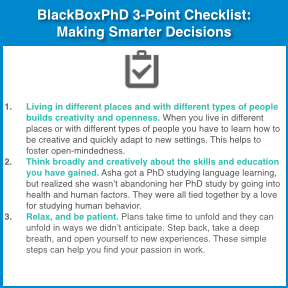
 Finding Your Internal Compass With Asha Dektor, PhD
Finding Your Internal Compass With Asha Dektor, PhD
My students often feel the pressure of having to know exactly what they want to do with the rest of their lives. It’s a feeling most people can relate to. You’re about to graduate high school, college, graduate school. What now? Society puts a lot of pressure on people to know their path and stick to one path, but not everyone follows one path. I know I didn’t. But how do we know the path that is right for us? Asha Dektor found her way to getting a PhD at Stanford University and the work she loves by being open-minded and open to new opportunities. In this week’s interview, she’ll tell you how being open-minded helped her find her passion for work and how it can help you.
Hi Asha, you’ve lived in some pretty diverse places. Can you tell us about the different places where you grew up?
My father was in the Air Force, so we did a reasonable amount of traveling. I was born in Columbus, Ohio and lived in Aviano, Italy, Oscoda, Michigan, and Warner Robins, Georgia before heading to Macon, Georgia to attend Wesleyan College. I moved to California in 2003 to attend graduate school at Stanford University. I still live in Palo Alto, near the university.
Do you think living in all of those places led you to be open to new experiences, new people, new opportunities? Or if not, then what do you think made you so open-minded to try new things?
When you move to a new place, either inside or outside of the U.S., you have to learn to adapt to a new culture and figure out where you fit in. The  transition can be difficult if you are too stuck in your ways. Being creative and figuring out how to nurture your interests in a novel setting can be a really valuable tool.
transition can be difficult if you are too stuck in your ways. Being creative and figuring out how to nurture your interests in a novel setting can be a really valuable tool.
How has being open-minded and saying yes to opportunities helped you find your calling in work and life? Tell us about some examples in your life and how you got to each one.
As I came closer to graduating from my Ph.D. program, I had the revelation that I did not want to follow the path into academia that I had been training for for so many years. I was surprised to find out how many options there were for psychologists outside of the college campus. My background lent itself to opportunities in areas ranging from marketing research to aircraft cockpit display design.
Having focused on my narrow dissertation topic for so long, the main challenge was determining which of these new areas would be a good fit for me. This exploration required taking a step back and identifying what I enjoyed most about my discipline and what I wanted to continue to pursue despite the shift from academia. My first step was meeting with research psychologists who had taken non-academic career paths. Much like moving to a new place, I approached each meeting with the goal of identifying the similarities between my background and the new area, rather than focusing on the, often more obvious, differences.
After many phone interviews and coffee chats, it was time to decide where to send my resume. To help with this decision, I asked myself why I wanted to pursue a career in psychology in the first place. I revisited my introduction into cognitive psychology and realized that I grew to love the field because of the exciting puzzle of figuring out why people behave the way they behave, even against their best intentions. With this broad description, I realized that there were few jobs that did not have the potential to be a good fit!
Over the past 6 years, I found opportunities (internships, contract positions, and full-time positions) in marketing research, design research for aerospace and astronautics, design research for mobile applications pertaining to health and wearable devices, and human factors consulting regarding product safety. Entering each new role was novel and often intimidating. However, as time would pass, I would become more comfortable and learn to love a new application of psychology that I’d never experienced. For example, I ran my first user study at NASA Ames Research Center and have been running them in every job that followed. The important thing for me was to always take time to reflect. What is my favorite thing about this position? If there is a need to move on to the next new things, what did I learn during this position to I want to make sure I take with me?
In line with openness to new experiences, I am currently working in human factors consulting. As a fun happy ending, I now make my living applying my background to a diversity of issues and questions posed by clients.
Do you think being open to new experiences and new ideas is a quality that anyone can gain? Is it nature or nurture?
That is a tough question. I have met people who find their passion early on and don’t have a need for exploration. Would they fair well in a new context? Who knows, but if they are happy where they are, there is no real need to figure that out.
For those of us who do need to step out of our comfort zones, in the least, I believe we are equipped with the ability to try something new. Many factors can play into whether or not the experience generates drive and excitement once we enter into a new environment.
 What have you learned about yourself along your journey with all of the different things you’ve done?
What have you learned about yourself along your journey with all of the different things you’ve done?
I have learned that I can provide value in different contexts and that I perform the best when I work hard without being too hard on myself.
What advice would you give to other people who are trying to find their next position in work, or a position to have for life? These could be students who are graduating and aren’t sure what to do, people who have been working but are looking for a change, or people who have never found their passion and want to know where to look.
Relax. Sometimes when a very specific path that we’ve laid out for ourselves doesn’t play out as expected, it is easy to panic. Taking a step back and keeping an open mind can help us see that there are often many paths to pursuing our broad interests. I have been able to explore various work contexts and research questions without having to abandon my genuine love for understanding human behavior.

Pingback: what are dofollow backlinks
Pingback: Tiffany online
Pingback: GVK BIO
Pingback: Dungeon
Pingback: Informatii despre sanatate
Pingback: Christ Gospel Church Cult
Pingback: binaural
Pingback: DMPK Services
Pingback: Corporate Event Management Company in Hyderabad
Pingback: adme services
Pingback: agen poker terpercaya
Pingback: basement water
Pingback: Stix Events Company in Hyderabad
Pingback: iraqi coehuman
Pingback: sports photography
Pingback: situs penerimaan cpns 2018
Pingback: SEO Consultants
Pingback: pendaftarancpns
Pingback: home
Pingback: Digital Corporate Reputation Management Services
Pingback: scribd registration
Pingback: Bangalore Escorts
Pingback: Kolkata Escorts
Pingback: Goa Escorts
Pingback: Ambika Ahuja Jaipur Escorts
Pingback: NEHA TYAGI MODEL JAIPUR ESCORTS
Pingback: JAIPUR ESCORTS ALIYA SINHA
Pingback: BANGALORE COMPANION ESCORTS
Pingback: Dhruvi Jaipur Escorts
Pingback: JAIPUR ESCORTS MODEL DRISHYA
Pingback: Jiya Malik High Profile Jaipur Escorts Model
Pingback: FUN WITH JAIPUR ESCORTS PUJA KAUR
Pingback: XXX BANGALORE ESCORTS
Pingback: Selly Arora Independent Bangalore Escorts
Pingback: Enjoy With Jaipur Escorts Tanisha Walia
Pingback: RUBEENA RUSSIAN BANGALORE ESCORTS
Pingback: Bristy Roy Independent Bangalore Escorts
Pingback: Bangalore Escorts Sneha Despandey
Pingback: diyala+ sciences
Pingback: gypsy
Pingback: boutique en ligne
Pingback: iPhone usati
Pingback: Ruby Sen Kolkata Independent Escorts
Pingback: Diana Diaz Goa Independent Escorts Services
Pingback: Diksha Arya Independent Escorts Services in Kolkata
Pingback: Devika Kakkar Goa Escorts Services
Pingback: Rebecca Desuza Goa Independent Escorts Services
Pingback: Yamini Mittal Independent Escorts Services in Goa
Pingback: Simmi Mittal Kolkata Escorts Services
Pingback: Best buy webroot install
Pingback: Kolkata Escorts Services Ragini Mehta
Pingback: Navya Sharma Independent Kolkata Escorts Services
Pingback: Elisha Roy Goa Independent Escorts Services
Pingback: Alisha Oberoi Kolkata Escorts Services
Pingback: Divya Arora Goa Independent Escorts Services
Pingback: Simran Batra Independent Escorts in Kolkata
Pingback: Ashna Ahuja Escorts Services in Kolkata
Pingback: Goa Escorts Services Drishti Goyal
Pingback: Mayra Khan Escorts Services in Kolkata
Pingback: Sofia Desai Escorts Services in Goa
Pingback: Sruthi Pathak Escorts in Bangalore
Pingback: Ambika Ahuja Jaipur Escorts Services
Pingback: sirius latest movs192
Pingback: comment867
Pingback: comment83
Pingback: comment607
Pingback: comment338
Pingback: comment700
Pingback: comment709
Pingback: comment952
Pingback: comment566
Pingback: comment595
Pingback: comment442
Pingback: comment916
Pingback: comment34
Pingback: comment84
Pingback: comment242
Pingback: comment135
Pingback: comment114
Pingback: comment112
Pingback: comment363
Pingback: comment158
Pingback: comment954
Pingback: comment715
Pingback: comment641
Pingback: comment5
Pingback: comment123
Pingback: comment258
Pingback: comment654
Pingback: comment835
Pingback: comment547
Pingback: comment332
Pingback: comment205
Pingback: comment669
Pingback: comment358
Pingback: comment390
Pingback: Sruthi Pathak Bangalore Female Escorts
Pingback: sirius latest movs914 abdu23na6522 abdu23na85
Pingback: freshamateurs473 abdu23na7529 abdu23na3
Pingback: download on mobile322 afeu23na7592 abdu23na83
Pingback: tubepla.net download265 afeu23na8838 abdu23na97
Pingback: Sruthi Pathak Bangalore Escorts Services
Pingback: Trully Independent Bangalore Escorts
Pingback: Trully Independent Bangalore Escorts Services
Pingback: Fiza Khan Kolkata Independent Call Girls Services
Pingback: Ruchika Roy Kolkata Escorts Call Girls Services
Pingback: Kolkata Independent Escorts
Pingback: Fiza Khan Kolkata Independent Escorts Call Girls Services
Pingback: Fiza Khan Kolkata Call Girls Escorts Services
Pingback: Diksha Arya Kolkata Escorts Call Girls Services
Pingback: Diksha Arya Kolkata Independent Escorts Call Girls Services
Pingback: website
Pingback: Escorts
Pingback: Cheap
Pingback: Nidika Offer Call Girls in Bangalore
Pingback: Hyderabad Escorts Call Girls Services
Pingback: Bangalore Cheap Escorts Sevices
Pingback: Pune Escorts Services Call Girls
Pingback: Goa Escorts Call Girls Services
Pingback: Bangalore Escorts Services
Pingback: bdaxwbvl
Pingback: what happens if u dont finish zithromax
Pingback: augmentin online
Pingback: furosemide 40mg tabs
Pingback: buy zithromax online without prescription
Pingback: ivermectin 4 tablets price
Pingback: ventolin for sale online
Pingback: synthroid for sale
Pingback: propecia thinning hair
Pingback: neurontin and anxiety
Pingback: diarrhea and metformin
Pingback: plaquenil and sulfa
Pingback: lucknow-escorts-models.jigs
Pingback: independentlucknowescorts
Pingback: amoxil online
Pingback: lasix vs furosemide
Pingback: neurontin tablets uk
Pingback: quineprox 200 mg
Pingback: prednisone 10 mg
Pingback: priligy for sale
Pingback: provigil australia
Pingback: buy ivermectin nz
Pingback: expired albuterol
Pingback: azithromycin purchase
Pingback: lasix 250 mg
Pingback: prednisone india
Pingback: avana 200mg
Pingback: latisse cost
Pingback: baricitinib lilly
Pingback: 12mg tizanidine
Pingback: lumigan uses
Pingback: indian escorts in dubai
Pingback: cheap call girls in lucknow
Pingback: call girls in delhi
Pingback: call girls in delhi
Pingback: call girls
Pingback: bangalore call girls
Pingback: bangalore call girls
Pingback: independent escorts in aerocity
Pingback: call girls in lucknow
Pingback: russian escorts in delhi
Pingback: ghaziabad escorts
Pingback: ghaziabad escorts
Pingback: ghaziabad escorts